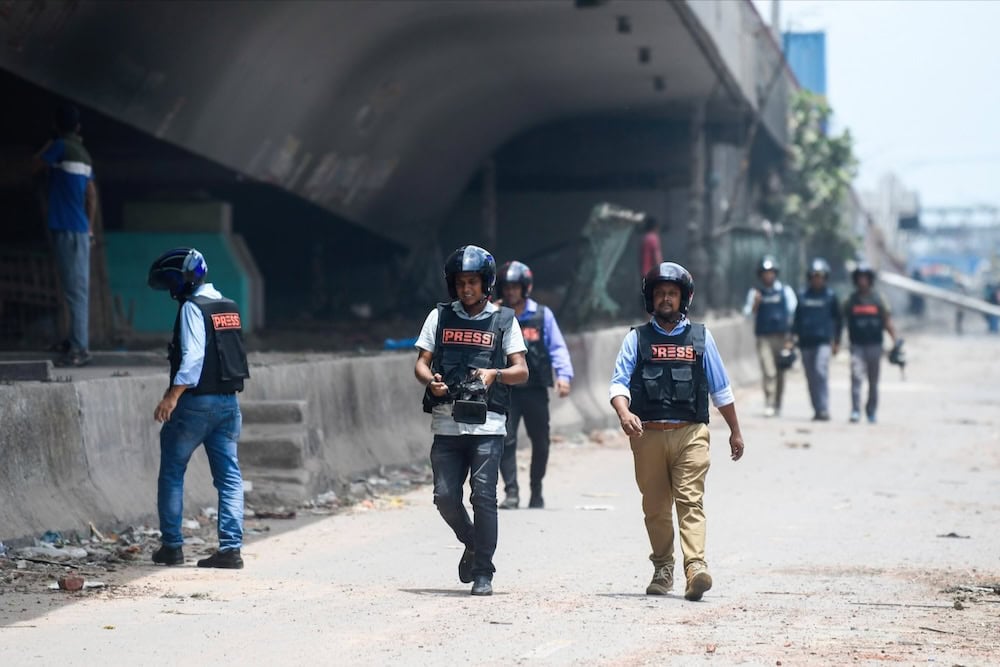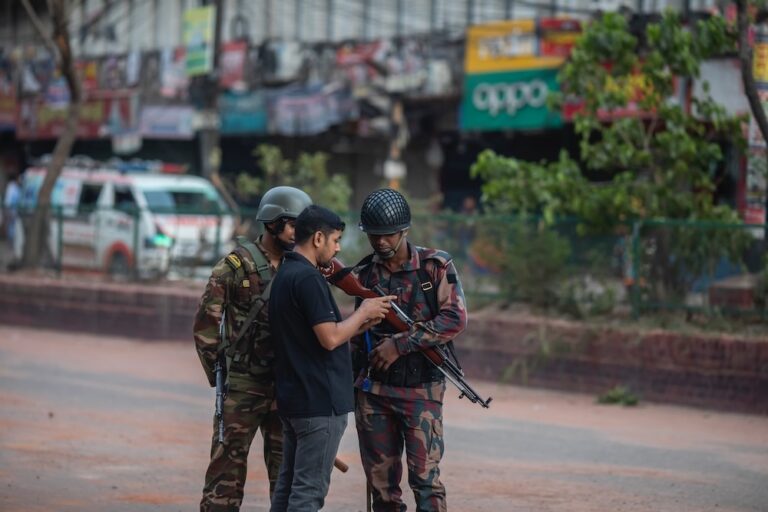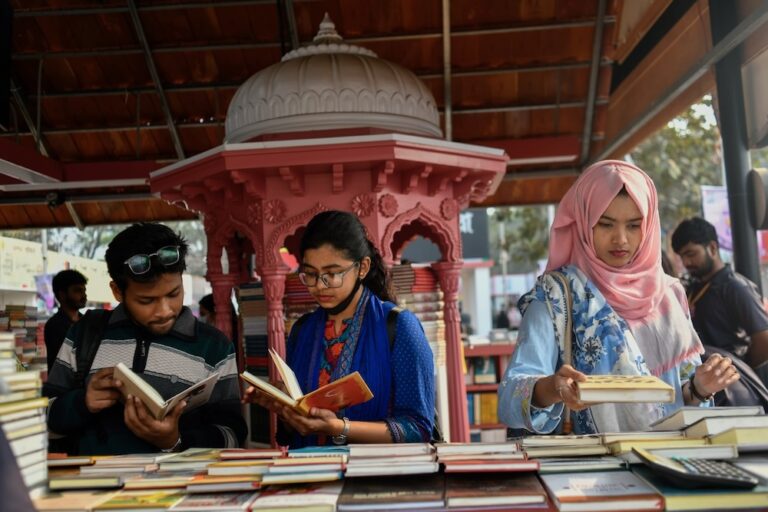It is vital that the interim government commits to establishing democratic governance and to protecting and promoting human rights. This includes investigating the attacks on journalists and holding perpetrators accountable to prevent a culture of impunity.
29 August 2024
Dear Honourable Chief Adviser Dr. Muhammad Yunus,
IFEX, the global network of 119 member-organisations dedicated to promoting and defending the right to freedom of expression and information, condemns the violence perpetrated against journalists during the crackdown by security forces in response to student-led peaceful protests that have been ongoing since 1 July against the reinstatement of a discriminatory government job quota system in Bangladesh. We urge the interim government to launch an independent investigation into the attacks and killings of journalists as a critical next step to prevent impunity and its consequential impact on freedom of expression.
At the time of writing, at least five journalists have been killed amid the violent crackdown that has seen a surge of attacks on journalists from all sides, including police, security forces, supporters of former Prime Minister Sheikh Hasina’s Awami League party, and protesters. While covering the protests, journalists have reported being beaten, attacked, fired upon, and forced to erase footage. In some instances, journalists may have been deliberately targeted for their work reporting on issues such as corruption or sharing photos of the protests.
Media outlets and press clubs have also been targeted. On 14 August, a group reportedly linked to the Bangladesh Nationalist Party broke into and vandalised the Chittagong Press Club, leaving 20 journalists injured and compelling some senior newsroom editors to quit. Similarly, on 19 August, the offices of the East West Media Group, which houses various media outlets, were vandalised and journalists injured by approximately 70 individuals who were calling for former Prime Minister Sheikh Hasina to be brought to justice.
The ongoing violence and targeting of journalists and the media have alarmingly persisted under the new interim government as pro-Awami League journalists, as well as those accused of colluding with the Hasina government, are facing new threats and reprisals. Following Hasina’s resignation in early August, offices of Somoy TV, Ekattor TV, and DBC News, seen as sympathetic to the previous government, were vandalised. Meanwhile murder charges filed against Hasina for the killings of protesters appear to have been extended to include pro-Awami League journalists. Two journalists from Ekattor TV have been arrested and detained in at least three murder cases under accusations of inciting the former government to violence, and seven journalists have been charged in connection with the murder of a student protester. The Jatiya National Press Club also recently saw a change in leadership with pro-Awami League journalists being expelled and one of them facing a travel ban.
The increasingly restrictive environment for journalists, despite the change in government, follows the Hasina government’s long history of interference with and repression of media freedom, independence, and freedom of expression, which predates the protests. These actions have led to public criticism of the media and fuelled attacks by the government.
A lack of transparency around media ownership and political affiliations, along with prominent pro-government media coverage, particularly in the early days of the Hasina government, has created a restrictive environment for independent media. Restrictive laws, such as the Digital Security Act 2018, recently replaced by the still repressive Cyber Security Act 2023, have further limited media freedom. Over time, these dynamics have contributed to a public perception that the media are mouthpieces for the government, gradually sowing mistrust among those opposed to the Hasina government.
At the same time, independent journalists and media outlets have faced government-sponsored attacks including judicial harassment, police violence, and torture, creating a culture of fear around publishing opposing narratives, which further fuels public mistrust in the media as a reliable and unbiased source. The resulting media environment is that of pervasive self-censorship or government pandering among journalists to avoid targeted attacks, and an absence of editorial and journalistic independence, which consequently shrinks access to verifiable and trustworthy information.
Under these conditions, journalists have faced heightened risks of being targeted by anti- and pro-government protesters and law enforcement alike, limiting the coverage of the protests and perpetuating the deteriorating environment for free expression. The growing reprisals facing pro-Awami League journalists also threaten to replicate the Hasina government’s practices, threatening the environment for media pluralism.
Bangladesh is at a critical juncture in its political transition. It is vital that the interim government commits to establishing democratic governance and to protecting and promoting human rights. This includes investigating the attacks on journalists and holding perpetrators accountable to prevent a culture of impunity. In addition, the protection, support, and promotion of all journalists and media outlets is crucial for media pluralism and to foster a safe and enabling environment for diverse voices to flourish. In turn, this will pave the way for a healthy information ecosystem and the restoration of public trust in the media.
Thus, we urge the interim Government of Bangladesh to:
- Conduct an independent and thorough investigation into the targeting and killings of journalists and the attacks on media outlets, and hold those responsible accountable;
- Ensure the safety of journalists and media outlets during the political transition by protecting and supporting them to carry out their work independently without fear of attacks, intimidation, criminalisation, interference, or censorship; and
- Uphold Bangladesh’s responsibilities to promote and protect human rights by adhering to international human rights obligations to ensure that the rights to exercise freedom of expression and information, as well as freedom of assembly and association are respected, in accordance with Articles 19 and 21 of the International Covenant on Civil and Political Rights.



